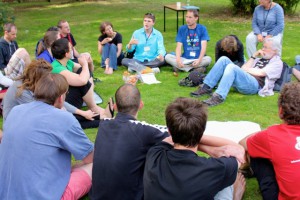In his guest post, Mattan Mamane argued that any form of central planning of the economy should be avoided, and only turned to when necessary. I have to say, I tend to agree with this approach. But first of all, I think there’s a case to be made for placing severe limitations on freedom when it comes to economics, because such limitations are already – actually, always – necessary. And second of all, there is planning and there is planning – not all planning is the same.
Now, I feel I lack some of the historical background knowledge that Mattan brings along. I can be ignorant sometimes, as I form my opinion in discussions more often than in deep reading. But if I’m not mistaken, the important insight of socialism is that there are certain dynamics in an unrestricted market which severely, systemically, and systematically limit the freedom of vast swathes of the population.
The idea of basing the economy on central planning is not a good one, that’s for sure. It depends on the planners being very smart, very well-informed, very quick, and very moral. With any of those missing, people will suffer. But obviously there are many economies, most economies really, which are based on many individuals making individual decisions without central planning, but within a set of rules and systems designed to protect societies from some of the ills of unlimited capitalism. I said “most economies” but it’s really all modern states, as modern states have laws and modern governments manipulate the economy in all kinds of ways. It’s really a question of how.
Mattan brought up a good example: privatization. Privatization of public institutions can be good, but the calls in the #J14 movement to end privatization in Israel are justified: the kind of privatization pushed there by Netanyahu and others is not the right kind; calls for tenders are tailored towards single corporations or individuals with large sums of money. As a result, privatization is used to drive more economic centralization and harms the competition needed for a free market; instead of a single government carrier for public services, we get a single private carrier, without the checks and balances of public oversight nor those of multiple private shareholders.
So it’s not privatization itself that is good/bad, it’s how you privatize that can be a great thing or a really bad thing. In the same way, combatting economic centralization or poverty can be done in good ways and in bad ways, and I think Mattan’s suggestion of focussing on freedom is a very good one.
However, I would caution Mattan and others from believing the oft-repeated claim that everyone is better off in a USA-style capitalistic society. Perhaps they are when compared to economies based on central planning, but the modern state is a very new thing as far as history is concerned, and we probably have all kinds of economies to try out. I think it is key to recognize systemic problems with existing systems, and try to figure out how these can be overcome.
One systemic problem of capitalistic societies is poverty. Here I mean relative poverty: being poor compared to the people in your society – not some absolute idea of poverty compared to the whole planet. We are all encouraged implicitly or explicitly to be innovative, take charge of our future, and be the very best we can be. Poverty, as I understand it, is a feature of the system of modern society: the existence of a category of person who, from birth, is not so likely to achieve those things which we should all aspire to. Perhaps some people are poor because they somehow have less potential, by nature, but this is not what I mean.There are many brilliant people born into poverty, who simply have the odds stacked starkly against them from the start. ((I believe that people’s ability is affected very much by their schooling and upbringing; specifically, I think that a traumatic childhood – such as that experience by most of us in unjust factory-like child-correction institutions mockingly called “schools” – is key to limiting people’s ability in most areas. But that’s a topic to be tackled separately.))
The measures taken against poverty are many and varied, and some are better than others. Welfare, at least as I know it in Germany, is not a very good one, in my opinion. Under this system, people have access to a living stipend if they meet certain criteria, the main type of welfare being available to people who are unemployed. Even assuming the stipend is enough to keep them from being poor, this system still limits their freedom: they have to go through embarrassing, even humiliating bureaucratic procedures on a regular basis and are forced to take a job, any job, even one they would hate. Such a system makes poverty slightly less awful without making it go away, and diminishes people’s freedom in the process.
Does this mean that welfare as a whole is a bad idea? I don’t think so. The German system just isn’t a good way of doing it. Perhaps all welfare systems ever tried aren’t good, but that doesn’t mean a good one can’t be created.
What I beg you to realize is that systemic problems in an economic system are never “somebody else’s problem”. They belong to everyone in that system, whether you happen to mainly benefit from it or mainly suffer. Like me, you probably have that image in your mind of a self-made man insisting that he made every single cent by his own hard work and wits, insisting that nobody ever helped him, outright raging that he doesn’t owe anybody anything. I’m sure many wealthy and successful people feel this way; if they didn’t personally make the fortune but rather inherited, they might feel this way on behalf of whatever ancestor did. But those who feel this way are deluding themselves. We live within complex social systems which can empower us to do great things or condemn us to lives of hardship. Sure, some measure of luck and some measure of ability are involved – but they do not exist in a vacuum. If you benefit from a system and that same system makes others suffer, their suffering is your problem, and you are benefitting from it whether you like it or not. I don’t mean to say the wealthy or successful are evil or something – just that no matter what they think, they bear a responsibility for the poor and the failures.
I think we have to take responsibility over the systems we live in and be brutally honest with ourselves about what they do right and what they do wrong. And when we recognize a wrong, we have to be creative and find a way to fix it while doing as little wrong as possible. It’s not easy, but it seems to me like an interesting challenge, and I believe it is the right thing to do.
I have one or two more guest posts lined up to continue this discussion. In the meantime, comments are open. What do you think about all of this? Are there good ways to improve capitalism? If so, what are they?







